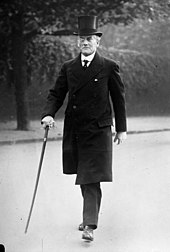Austen Chamberlain
Sir Joseph Austen Chamberlain , KG (born October 16, 1863 in Birmingham ; † March 17, 1937 in London ) was a British politician and Minister of Post from 1902 to 1903, Minister of Finance from 1903 to 1904 and 1919 to 1921, and from 1924 to 1929 Foreign minister. In 1925 he received the Nobel Peace Prize together with US Vice President Charles G. Dawes .
life and work
Sir Joseph Austen Chamberlain, the eldest son of the British Trade and Colonial Secretary Joseph Chamberlain and half brother of the late Prime Minister Neville Chamberlain , first attended Rugby School and then completed his studies in history at Trinity College of the University of Cambridge . He then studied nine months at the École des Sciences Politiques in Paris and twelve months in Berlin . When he returned to Birmingham in 1887, he first worked as the private secretary of his father Joseph Chamberlain.
His political career began in the office of Mayor of Birmingham. From 1892 he was an MP in the House of Commons for the Liberal Unionists, which were led by his father. From 1900 he was finance secretary in the treasury. From 1902 he was a member of the Conservative Parliament. From 1902 to 1903 Chamberlain was Postmaster General of the United Kingdom and from 1903 to 1905 Chancellor of the Exchequer . In 1911, after the resignation of Arthur Balfour , he ran for chairmanship of the Conservative Party, but withdrew his candidacy to help the compromise candidate Andrew Bonar Law to be elected at the meeting of Conservative MPs . From 1915 to 1917 he worked as State Secretary for India and from 1918 as a member of the War Cabinet . During the First World War , Chamberlain resolutely advocated British participation. After the war, he was the country's finance minister from 1919 to 1921 and advocated a strict tax policy to repay national debt. In 1921 he became party leader of the Conservative Party and in the same year Lord Seal Keeper and Leader of the House of Commons . At the Carlton Club meeting of 1922, however, the Conservative MPs spoke out against the coalition he supported and Chamberlain resigned as party leader.
In 1924 he was appointed Foreign Minister under Prime Minister Stanley Baldwin and held this office until 1929. In this position, he and his French and German counterparts Aristide Briand and Gustav Stresemann played a key role in the preparatory work and the conclusion of the 1925 treaties Locarno involved. This international treaty between Belgium, Germany, France, Great Britain and Italy was supposed to stabilize the European peace order after the First World War and offer a guarantee for the borders agreed between the countries Belgium, Germany and France and thus contribute to the reconciliation of the former war opponents. In this treaty, Germany was assured of admission to the League of Nations . For his contribution to the creation of this post-war European order, he received the Nobel Peace Prize in 1925 together with the American financial politician Charles G. Dawes. He supported him as early as 1924 in drawing up his Dawes Plan , which was supposed to enable the currency in Germany to stabilize and which served as a prerequisite for the Locarno Treaties.
He died of a stroke in London on March 17, 1937.
Works
- The League of Nations. Jackson, Wiley, Glasgow 1926
- Peace in Our Time: Addresses on Europe and the Empire. Allen, London 1928
- Speeches on Germany. Friends of Europe Publications, London 1933
- Down the Years. Cassell, London 1935
- Politics from Inside: An Epistolary Chronicle, 1906-1914. Cassell, London 1936 (German edition together with Down the Years as English Politics: Memories from Fifty Years. Essen Publishing House, Essen 1938)
literature
- Sir Charles Petrie : The Chamberlain Tradition. Stokes, New York 1938
- Sir Charles Petrie: The Life and Letters of the Right Hon. Sir Austen Chamberlain. Cassell, London 1939
- Joseph-Louis Coudurier de Chassaigne: Les Trois Chamberlain: Une Famille de grands parlementaires anglais. Flammarion, Paris 1939
Web links
- Austen Chamberlain at Hansard (English)
- Literature by and about Austen Chamberlain in the catalog of the German National Library
- Newspaper article about Austen Chamberlain in the 20th century press kit of the ZBW - Leibniz Information Center for Economics .
- Information from the Nobel Foundation on the 1925 award ceremony for Austen Chamberlain
- Entry in the Encyclopædia Britannica (English)
- DJ Dutton (2004): Biography (pdf, 20 pp. Engl.)
| predecessor | Office | successor |
|---|---|---|
| Charles Vane-Tempest-Stewart |
Postmaster General 1902–1903 |
Edward Stanley |
| Charles Ritchie |
Chancellor of the Exchequer 1903–1905 |
Herbert Henry Asquith |
| Robert Crewe-Milnes |
Secretary of State for India 1915-1917 |
Edwin Samuel Montagu |
| Andrew Bonar Law | Chancellor of the Exchequer 1919–1921 |
Robert Horne |
| Andrew Bonar Law |
Lord Seal Keeper 1921–1922 |
Robert Cecil |
| AV Alexander |
First Lord of the Admiralty in 1931 |
Bolton Eyres-Monsell |
| personal data | |
|---|---|
| SURNAME | Chamberlain, Austen |
| ALTERNATIVE NAMES | Chamberlain, Joseph Austen |
| BRIEF DESCRIPTION | British politician, Member of the House of Commons and Secretary of State |
| DATE OF BIRTH | October 16, 1863 |
| PLACE OF BIRTH | Birmingham |
| DATE OF DEATH | March 17, 1937 |
| Place of death | London |


